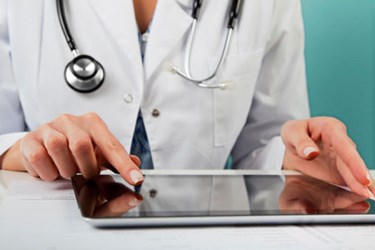More Doctors Using Mobile Devices For CPOE


Health IT is changing traditional practices and behaviors, as well as saving health systems millions of dollars.
With all the new technology being implemented in healthcare, notifying physicians with paging systems, e-mails, phone calls, and yelling down the hall is being replaced by integration of mobile device applications and CPOE systems. New medical apps available to physicians offer immediate notification of any new orders, consultations, or communications concerning a patient’s status that have been entered via the hospital’s CPOE system.
Physicians are more frequently utilizing medical applications on their mobile device for assistance on the job. For a new report, MedData Group conducted a survey of 532 physicians. The results show at least 50 percent of the physicians polled used mobile applications for information when prescribing medicine and 20 percent used mobile apps for diagnosing, but less than 20 percent are currently accessing CPOE with mobile applications. However, the survey also revealed nearly 60 percent of those physicians surveyed stated they would consider using mobile apps to access CPOE within the next year.
It has been reported that the use of mobile app integration with CPOE software can save hospitals money. As reported by Healthcare IT News, a 300-bed facility saved approximately $2 million in only one year following the implementation of the popular mobile app Practice Unite. The evaluation demonstrates the sooner doctors are notified, the sooner interventions can be made. In fact, faster processing times – including earlier hospital discharge and shorter ER wait times – contributed to the impressive amount of money saved.
Healthcare IT News notes, “Surgeons reported that response times to clinical queries dropped from 2-4 hours to 15-30 minutes.”
Many rationales exist for the use of mobile device apps by physicians for CPOE including time efficiency, accuracy, and cost effective care. A study posted by Open Health News concludes, “Potential benefits of allowing employees to use consumer IT devices are tangible because they can impact not only the productivity of hospital employees but also the health of the people under their care.” This study pointed out the most successful method for implementation of mobile device app integration is to identify the benefits and minimize the security risks.
